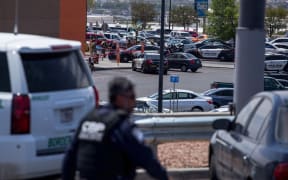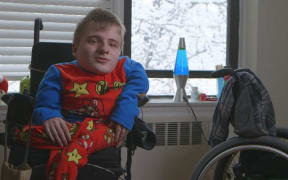By Nik Dirga*
Opinion: As an American living in New Zealand, I get asked about guns a lot.
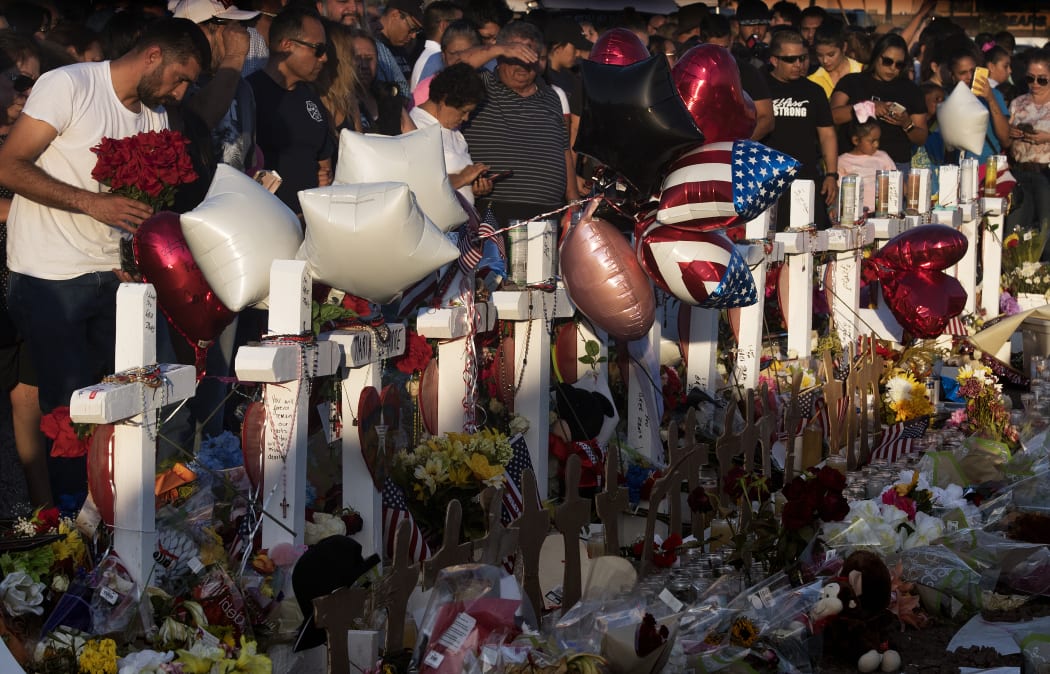
People pray and pay their respects at the makeshift memorial for victims of the shooting that left a total of 22 people dead in El Paso. Photo: AFP
The last week has been brutal. After a relatively blood-free interval, three major mass shootings in the United States in the past week have claimed at least 35 lives.
In 2019 so far, there have been 253 mass shootings in America, according to the Gun Violence Archive - defined as incidents in which at least four people were shot.
Every time this happens, I wonder what's happening to my homeland. Once massacres were big events, like the Columbine High School shootings of 1999. Now, they're almost routine.
You can blame the National Rifle Association, you can blame the President, you can blame the calcified political system, but more than anything, you have to blame the principle of gun ownership enshrined in America's Constitution.
Like most Americans, I can sketch a path across the vast country and see places I've been that have been affected by gun violence.
There was a restaurant in my small hometown in California where my friends and I hung out in high school, eating pies and discovering the delights of coffee. In 2001, a man shot up the restaurant and killed the manager. He killed two other people that day too.
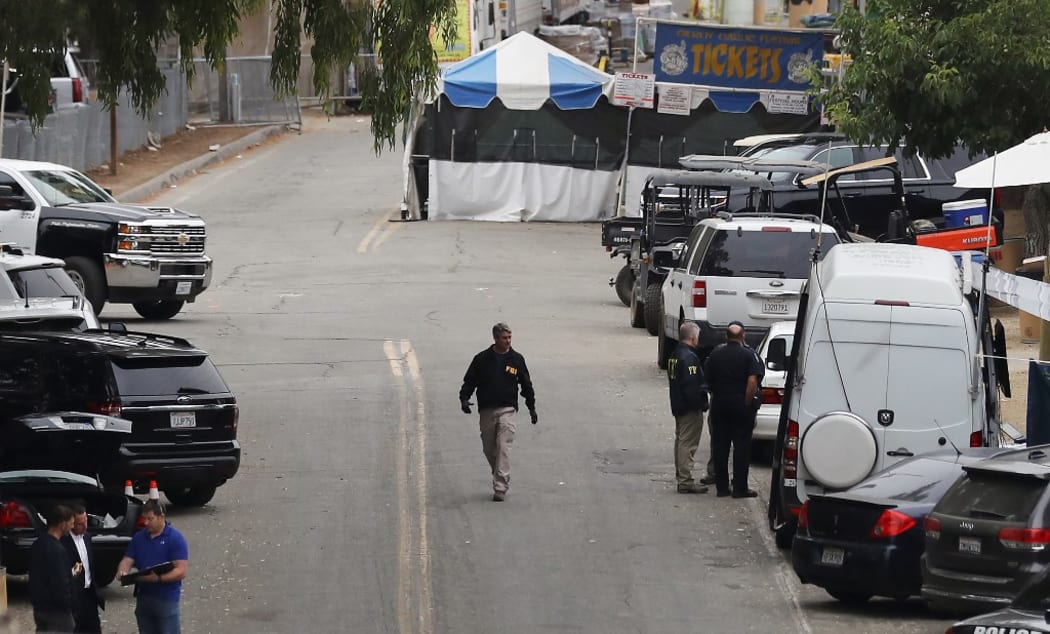
An FBI agent (C) walks near a ticketing booth for the Gilroy Garlic Festival two days after a mass shooting there. Photo: AFP
In Gilroy, California, last week, a town I've visited several times, a man killed three people at the local garlic festival, which is like shooting up a school fair. In the Oregon town I lived for several years before moving to New Zealand, a student at the local community college killed nine people and himself in 2015.
Last week, a disgruntled employee in Southaven, Mississippi killed two people at a Walmart, a few blocks away from the grocery store I worked at for two summers during university.
In 2017, a gunman in Las Vegas took aim from his hotel room and killed 58 people. The hotel was right next door to the one my wife and I stayed in on our honeymoon.
It's like a map of blood, trailing across America, where almost everyone knows a place where someone has been shot.
Yet nothing ever changes. The last substantial gun reform in America was the assault weapons ban passed by President Clinton in 1994. It expired in 2004, and Presidents Bush, Obama and Trump have all been unable to advance the issue.
US Senate Majority Leader Mitch McConnell has refused to let the Senate consider a gun background checks bill that passed the House earlier this year. And that's just background checks, not any substantive attempt to reduce the amount of guns owned in America - an estimated 120.5 per 100 people according to the Small Arms Survey 2018, the highest rate in the world.
It's frustrating. It's maddening, and many Americans are fed up with it too.
As Stephen Colbert said on his talk show the other night, "It's all well good to offer thoughts and prayers, but sometimes you want shouts and swears."
If you follow the US gun debate at all, you'll soon hear about the Second Amendment to the Constitution. That's the one that guarantees the right to bear arms, although whether that means arming yourself against the Brits in 1776 or buying a gun at Walmart in 2019 is open to debate.
You don't mess with the Constitution. It's as holy as the Ten Commandments, a steady guiding light by which Americans identify their values and what they'd like to be.
My home town in California even holds a Constitution Day Parade each year, with citizens dressed up as US Presidents and an ornate reenactment of the signing of the document. Little replica Constitutions are handed out to kids.
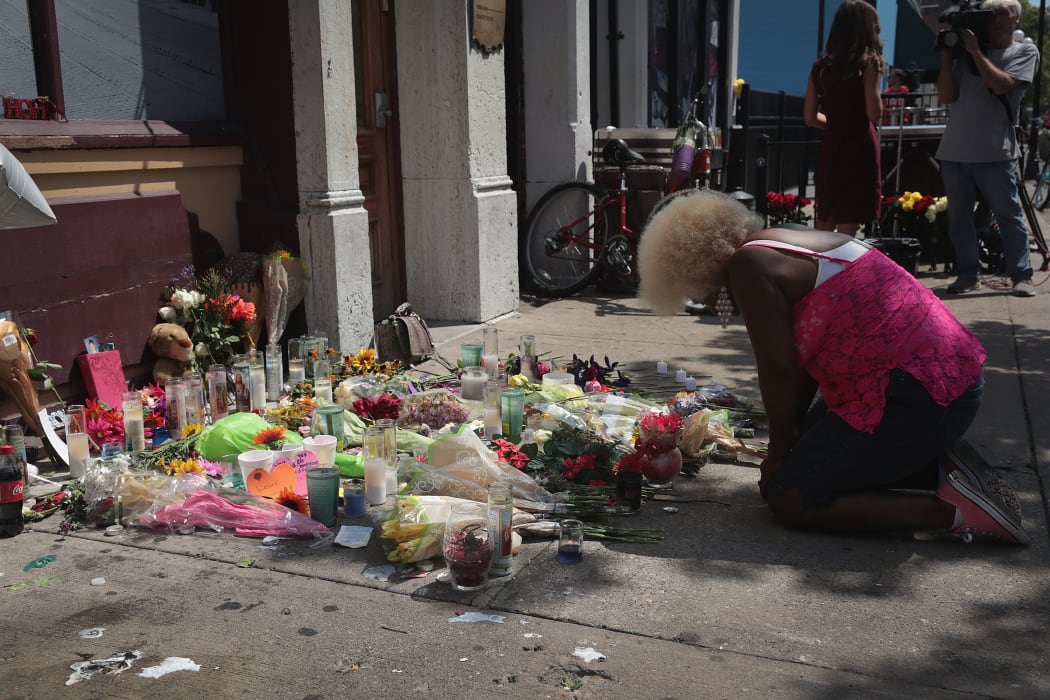
Annette Gibson-Strong visits a memorial to those killed in yesterday's mass shooting in Dayton, Ohio. Photo: AFP
One of the key things Americans debate about their Constitution is whether it's meant to be a living, changing document or a strictly followed text. Strict constructionists believe the text should be applied only as written. I believe the constructionists have been winning the public debate when it comes to the Second Amendment.
The courts and pundits can argue until the end of days about what the Second Amendment should mean in 2019, but to a big chunk of Americans, the very fact it's in the Constitution renders it sacrosanct. The Constitution is who Americans are. To many, taking away their guns would be like if New Zealand banned rugby.
New Zealand quickly acted to change gun laws after the Christchurch mosque massacre, and while there's been some criticism of these changes, very little of it has been people arguing that the right to own a semi-automatic military weapon is part of their identity as a kiwi.
There might be some benefit to New Zealand not having a formal written constitution - while the US Constitution is full of beautiful language and ideas, there's a down side to becoming so respectful of a sacred text that it no longer lives in the present. Perhaps it makes us a more flexible people.
I'm not a complete cynic about America. I love my homeland. But when it comes to America's shootings problem, I don't see an easy ending in sight when ossified views and a culture's very identity is tied up in the barrel of a gun.
Things might change, incrementally, but I feel like it's going to take generational change before America can abandon its gun worship. It's going to take years of children being exposed to active shooter drills and paranoia, of finger-pointing and angry editorials asking why nothing ever happens.
In the meantime there will be more maps of blood, spreading across the land.
*Nik Dirga is an American journalist who moved to New Zealand in 2006.
